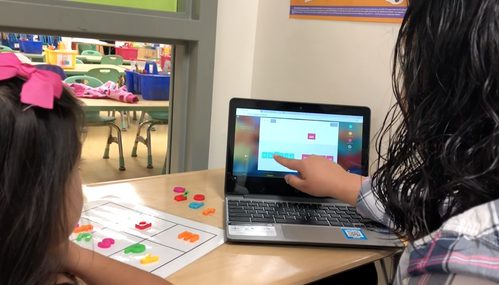Every Minute Matters: Inside Our Early Literacy Intervention Programme
Kathryn Taylor, Chapter One's Schools Development Manager, takes us behind the scenes of our Early Literacy Intervention Programme
At Chapter One, our Early Literacy Interventionists (ELIs for short!) are in school all year and are very much part of the daily school routine. Each morning and afternoon, they conduct their daily 7-minute sessions with targeted pupils. These sessions happen 3-5 times per week based on each child’s individual needs and provide both re-teaching of identified gaps in learning plus reinforcement of recent whole-class phonics teaching. Our programme ensures that children keep-up with whole-class teaching by receiving tailored, one-to-one support which not only builds knowledge and skills but also increases their confidence.
As the Chapter One Schools Development Manager, I lead the ELI team. I always look forward to visiting our schools and seeing the children we are supporting. They come out for their sessions with a big grin on their face and are always so excited to learn and tell you about everything that is happening in their world. I particularly enjoy observing the progress that they have made since I last saw them.
Our ELIs plan and assess every session that they deliver. They have a touch-screen laptop (provided by Chapter One) and work from their designated place in the school. The whole programme is designed to keep the input from the class teacher to a minimum. Our trained interventionists work independently but ensure they feedback to class teachers each week so that pupil progress and attainment can be discussed and evaluated. My role is to oversee and support their practice and I am always on hand to provide advice for any more challenging situations.
Although the programme is primarily about improving phonics knowledge and skills and therefore reading attainment, it is also about building confidence and positive relationships. I get to see how much every child benefits from working with each of our ELIs. Children who do not talk much in a whole-class setting feel free to speak when it is one-to-one. Children who struggle to say they do not understand feel comfortable expressing this when it is just them and their ELI. It is also beneficial to children who have English as an Additional language (EAL) or Special Education Needs and Disabilities (SEND) because they are able to express themselves in a quiet space away from distractions. We regularly get feedback from teachers that this specialist, ring-fenced time enables children to flourish and this new-found confidence is visible in the classroom setting.
At the end of each term, the ELIs complete tracker documents which demonstrate the progress each child has made and share them with the school staff. I always find them exciting to look at because seeing children progress is amazing! I am so proud of them and the ELI team because it reflects their hard work and dedication. Then, alongside the school’s own assessments, the trackers provide a guide for which children still need the support of the ELI programme. It is an incredibly flexible intervention - a child can remain with us for as long as they need to but can be easily swapped out if they no longer need us and can keep up with whole-class teaching.
Over the course of the year, we conduct regular data meetings with class teachers and senior school leaders to discuss progress and how the programme is benefiting the pupils. This is a time for celebration and a time for us to invite feedback. The programme is constantly growing and evolving and we welcome the thoughts and ideas of the schools we work with on how we can improve it further and have an even greater impact on young readers.
If you think that the pupils in your school could benefit from our ELI programme, please get in touch by emailing kathryn.taylor@chapterone.org
It all starts with literacy.
